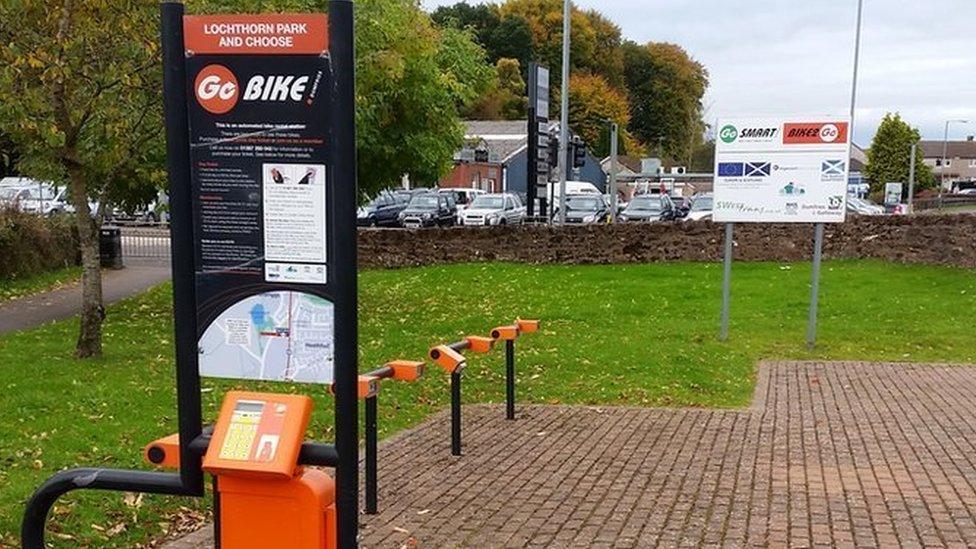Do public bike hire schemes work?
- Published
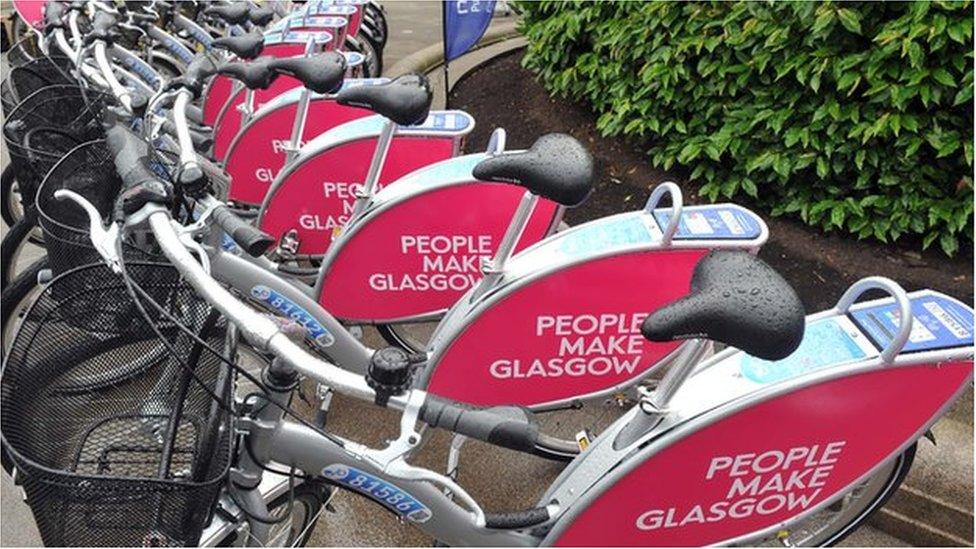
Edinburgh is the latest council to announce plans to introduce an on-street cycle hire scheme. Glasgow launched its public hire scheme before the Commonwealth Games in 2014 and there are now plans to double its size - but a free scheme in Dumfries failed to take off. What is the key to the success of these schemes, and what can put the brakes on them?
"My aim was four-fold: to get fitter, to save money, to save time and to do my bit for the environment," says Hugh McKenzie.
Hugh subscribed to Nextbike about two years ago and describes himself as a "fair weather" cycle scheme user.
"In the warmer months, I pick up a bike each morning at a bike station near my home in Stirling and cycle to another one at the bus station.
"At the other end I pick up a bike in Glasgow and cycle to work.
Hugh is one of thousands of users of the Nextbike schemes run in Glasgow and Stirling.
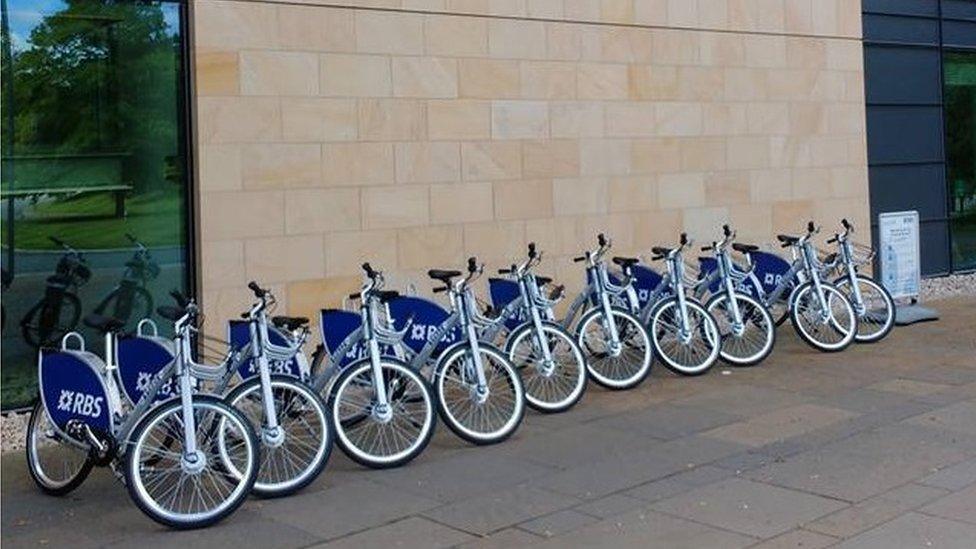
RBS has been piloting a Nextbike scheme at its Gogarburn headquarters
Glasgow City Council launched its project with £600,000 in 2014.
It started with 400 bikes located at 31 hire stations, and now has plans for up to 900 bikes at 100 stations.
It has just renewed its contract with Nextbike, providing £856,880 for start-up costs and operational support for the first year.
After that, Nextbike must operate and maintain the scheme without public subsidy.
Instead it will rely on sponsorship and rental charges.
Nextbike is confident - it already operates schemes elsewhere without public funding.
Operating for a decade, and now with 35,000 bikes in 24 countries, it says "the model works regardless".
But is the company being overly optimistic?
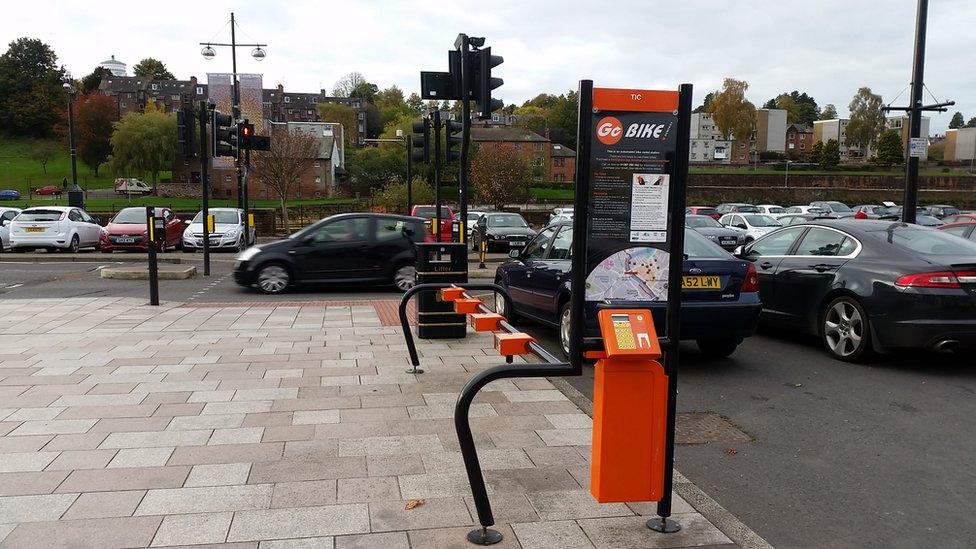
Rental cycles were withdrawn from stances across Dumfries after the project failed to take off
A £155,000 scheme launched in Dumfries in 2010, was dropped by the council after it failed to win public support.
The 42 bikes were hired just 2,270 times over three years, working out at more than £60 per rental.
Sally Hinchcliffe, of cycling Dumfries, said: "It's complex but I think the town is realistically too small to support a bike hire scheme.
"Even London has had to subsidise its scheme with sponsorship so it was always likely Dumfries would not be self-supporting."
Bike Plus, an umbrella group for Britain's bike-sharing schemes, says success relies on a range of factors.
For example, schemes benefit from an area with more than 50,000 homes, high employment, parking issues, a flat topography, and a favourable climate.
Despite not meeting all the preferred criteria, the Glasgow scheme does appear to be successful.
Bike data mapper Oliver O'Brien, a researcher at UCL, looked at data covering two weeks this month.
He compared Glasgow, Stirling, London, Reading and Liverpool, and found that Glasgow had the highest "simultaneous use" of bikes at 12.9%.
Stirling had the second highest usage at 11.5%, while London had 11.2% and Reading and Liverpool had 7.8% and 6.6% respectively.
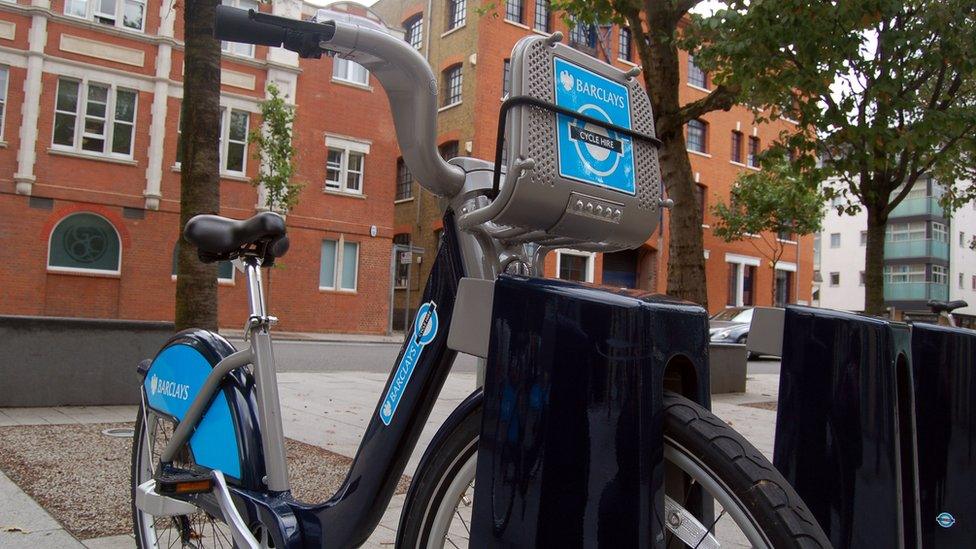
The London cycle hire scheme began in 2010 with corporate sponsorship
The Stirling scheme proves bike-sharing can be successful even on a smaller scale.
Corporate memberships have been key to the Stirling Nextbike scheme, which has 160 bikes.
The community project, led by Forth Environment Link and funded by Transport Scotland, has buy-in from local organisations.
Stirling University and Forth Valley College both pay an annual fee, which allows students and staff to get free membership.
Graham McQueen, of Forth Environment Link, says it is the fastest growing scheme in the UK.
In the past five months, the scheme has had 8,041 hires compared to 7,624 for the entire previous year, he says.
Royal Bank of Scotland has been trialling a Nextbike scheme at its Gogarburn site in Edinburgh.
It has 20 bikes, which the company says are well used by staff to travel around the site.
But will the scheme in Glasgow be able survive without public subsidy, and attract the eye of lucrative sponsorship?
That certainly happened in Portland, Oregon, in the US.
Last year, Nike paid $10m over five years to sponsor the city's 1000-strong bike-sharing scheme.
Clearly a "one size fits all" doesn't apply when it comes to bike-sharing schemes.
And things are changing rapidly, says Bike Plus, with the emergence of private sector "free floating" models.

In Shanghai, the authorities recently impounded hundreds of bike share cycles which they say were parked haphazardly
Chinese company Ofo has plans to start a scheme in Cambridge this year, described as the "Uber for bikes".
Under this system, there are no docking stations and instead there is an app to find a nearby bike, with no need for users to plan when and where to leave it.
These types of schemes could be controversial, with concerns over dumped bikes and pile ups at train stations.
Bike Plus hopes to introduce a new accreditation scheme to ensure certain standards for safety and environmental practices are met.
Despite the challenges, the benefits of these schemes may prevent any back-pedalling just yet.
A survey by Bike Plus, external found that bike-sharing schemes helped people become healthier, and cities less clogged.
It suggested that 13% of people began cycling because of the scheme, and 37% increased the amount they cycled.
It said the schemes also encouraged more women to cycle.
Nextbike user Hugh says: "The benefits are clear, so my advice would be: get out of that car and get cycling.
"I also - and I didn't think I'd say this - enjoy travelling to work and look forward to it."
- Published2 November 2016
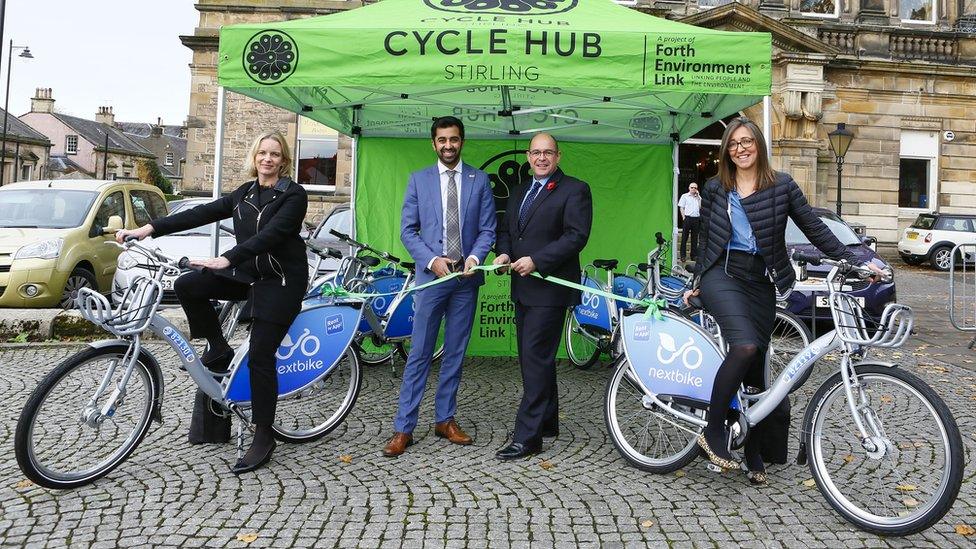
- Published25 August 2016
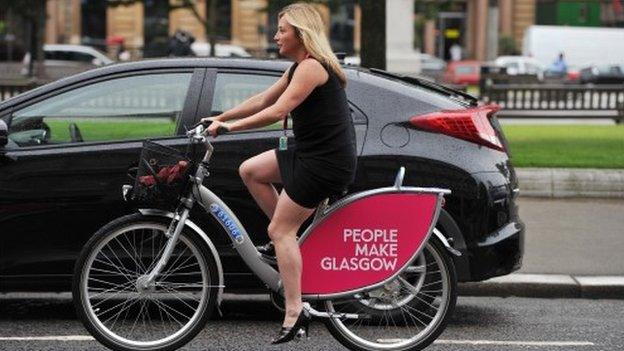
- Published19 April 2016
